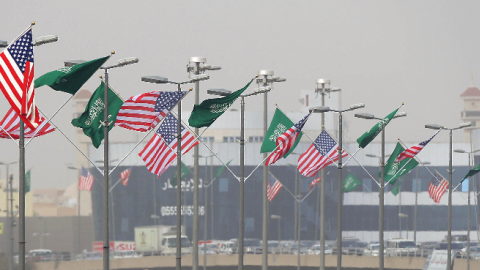When President Obama visits Saudi Arabia next week, he will have an opportunity to follow through on his inspiring words at the Feb. 6. National Prayer Breakfast. There, he told thousands of Christian leaders that "the right of every person to practice their faith how they choose" is central to "human dignity," and so "promoting religious freedom is a key objective of U.S. foreign policy."
The freedom so central to human dignity is denied by the Kingdom. The State Department has long ranked Saudi Arabia among the world's most religiously repressive governments, designating it a "Country of Particular Concern" under the International Religious Freedom Act. Yet the Obama administration, like its predecessors, has not pressed Riyadh to respect religious freedom.
Saudi Arabia is the only state in the world to ban all churches and any other non-Muslim houses of worship. While Saudi nationals are all "officially" Muslim, some two to three million foreign Christians live in the kingdom, many for decades. They have no rights to practice their faith. The Saudi government has ignored Vatican appeals for a church to serve this community, despite the fact that in 1973 Pope Paul VI approved a proposal for the Roman city council to donate city lands for a grand mosque in Rome. The mosque, opened in 1995, is among the largest in Europe.
Christian foreign workers in Saudi Arabia can only pray together clandestinely. Religious-police dragnets against scores of Ethiopian house-church Christians, mostly poor women working as maids, demonstrate the perils of worshiping: arrest, monthslong detention and abuse, and eventual deportation. The more fortunate do what I did when I visited three years ago—sneak off to pray in a windowless safe room behind embassy walls.
It's difficult to hide a worship service in the tightly-controlled kingdom. The Committee to Promote Virtue and Prevent Vice, the religious police, is always looking for women and men mingling together, women who fail to conform to the state-mandated Muslim dress code, and the movements of foreigners. University of Milan Professor Camille Eid, who has worked in Jeddah, reported to the Catholic outlet Zenit in 2011 that he was afraid even to give Christmas or Easter greetings over the phone for fear "someone might be listening."
Distributing Bibles in Saudi Arabia is illegal. Priests must go undercover, pretending to be cooks or mechanics, to celebrate underground Masses for the estimated 1.5 million Filipino, Indian and other Catholics working or living there. Crosses, rosaries and Christian literature and art must not be publicly displayed. Even the ruins of a fourth-century church in the Persian Gulf city of Jubail are kept off limits to the public and archaeologists.
The fanatical intolerance of everything Christian extends to a crackdown on red roses on Valentine's Day. Visiting European soccer teams with cross logos must blur the icon on team jerseys. At one holiday party in the American school in Riyadh, a Santa Claus had to jump through a window to escape religious police, according to Mr. Eid's account.
The official Saudi National Human Rights Commission director Bandar al-Aiban told me that churches are forbidden because the entire country is "a sacred mosque" for Islam's holiest shrines in Mecca and Medina—two cities completely closed to non-Muslims. He seemed unperturbed that Saudi national borders are a modern invention dating to 1932, not to Prophet Muhammad's era more than 1,300 years earlier.
No other country on the Arabian Peninsula adopts the Saudi anti-church stance. Qatar, which like Saudi Arabia practices strict Wahhabi Islam, allowed the first public Christian worship service in 1988 and has leased land for foreign workers to build more than a dozen churches since 2008. Last year Bahrain's monarchy donated land for the peninsula's first cathedral, a Catholic church called Our Lady of Arabia.
President Obama on his visit could ask King Abdullah to allow churches in the Kingdom. As the president explained in February, the right to worship is an essential human right that "matters to our national security." Allowing a church would help foreign Christian workers and instill in Saudi society a sense of peaceful coexistence with the religious "other." That may help us all.
The president could also call for other steps to temper national policies against Christians. Education Ministry textbooks, for example, still teach violent hatred against Christians, as well as Jews and other groups with different beliefs. A 10th-grade text tells students that homosexuals can be murdered by fire, stoning or being thrown from a high place. Saudi Arabia could also replace the state-employed religious leaders, who, the State Department reported in 2013, call for the destruction of all Arabian Peninsula churches and publicly pray for the "humiliation" of "polytheists," a term Wahhabis apply to Christians, Shiites and Hindus.
The kingdom is now organizing internationally against Iranian and al Qaeda extremism, so this is an especially good time to implore the country to begin ending religious extremism at home. So far President Obama has only preached to the choir. In a few days he will have a chance to make his case before the Saudi king.















